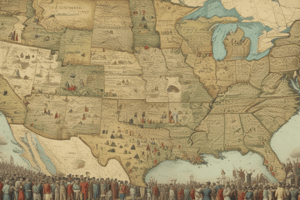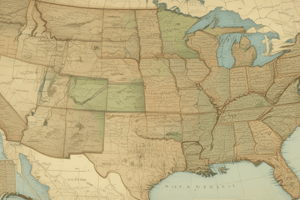Podcast
Questions and Answers
What was the Constitution launched in 1789?
What was the Constitution launched in 1789?
Growing Republic
Who was a French statesman known for his influence during the 18th century?
Who was a French statesman known for his influence during the 18th century?
Anne Robert Jacques Turgot
Who was unanimously drafted as President by the Electoral College in 1789?
Who was unanimously drafted as President by the Electoral College in 1789?
George Washington
What advisory group gradually evolved during Washington's administration?
What advisory group gradually evolved during Washington's administration?
What act organized the Supreme Court in 1789?
What act organized the Supreme Court in 1789?
Who was the Treasury Secretary and admired by Federalists?
Who was the Treasury Secretary and admired by Federalists?
What type of society did Thomas Jefferson believe the United States should remain?
What type of society did Thomas Jefferson believe the United States should remain?
Which states favored Hamilton's proposals due to heavy debts?
Which states favored Hamilton's proposals due to heavy debts?
Which state was against Hamilton's proposal due to small debts?
Which state was against Hamilton's proposal due to small debts?
What city is located on the Potomac River and was poised to gain in commerce and prestige?
What city is located on the Potomac River and was poised to gain in commerce and prestige?
How much did the national debt swell to in the early republic?
How much did the national debt swell to in the early republic?
Where did Hamilton suggest the money for the government's operations would come from?
Where did Hamilton suggest the money for the government's operations would come from?
What was the first tariff law passed by Congress in 1789?
What was the first tariff law passed by Congress in 1789?
What item was heavily taxed under Hamilton's excise tax in 1791?
What item was heavily taxed under Hamilton's excise tax in 1791?
What was the motto raised by defiant distillers during the whiskey tax protests?
What was the motto raised by defiant distillers during the whiskey tax protests?
What small rebellion involved whiskey distillers and resulted in minimal casualties?
What small rebellion involved whiskey distillers and resulted in minimal casualties?
Who was the British political observer who noted events during the period?
Who was the British political observer who noted events during the period?
What marked the beginning of the French Revolution in 1789?
What marked the beginning of the French Revolution in 1789?
What did the Neutrality Proclamation of 1793 signify?
What did the Neutrality Proclamation of 1793 signify?
Who was the thirty-year-old representative of the French Republic that caused controversy in America?
Who was the thirty-year-old representative of the French Republic that caused controversy in America?
What treaty was signed in Paris that effectively annulled the arrangement with France?
What treaty was signed in Paris that effectively annulled the arrangement with France?
What was the Sedition Act notorious for infringing upon?
What was the Sedition Act notorious for infringing upon?
What were the Virginia and Kentucky resolutions?
What were the Virginia and Kentucky resolutions?
Flashcards are hidden until you start studying
Study Notes
Growing Republic
- Constitution established in 1789, leading to significant population growth, doubling every 25 years.
- First census in 1790 recorded nearly 4 million individuals; major city populations: Philadelphia (42,000), New York (33,000), Boston (18,000), Charleston (16,000), Baltimore (13,000).
- 90% of the population lived in rural areas; only 5% resided east of the Appalachian Mountains.
- Trans-Appalachian migration settlement in Kentucky, Tennessee, and Ohio; Vermont entered the Union as the 14th state in 1791.
Key Figures
- Anne Robert Jacques Turgot: French statesman (1727-1781).
- George Washington: Unanimously elected as the first president in 1789; acknowledged as the "Father of His Country" with a distinctive physical appearance and strong character.
- Alexander Hamilton: Treasury Secretary and key architect of economic policies; prioritized national credit and federal assumption of state debts. Resigned in 1795 to lead the Federalist "High Federalists."
Government Structure
- Cabinet not specified in the Constitution but evolved during Washington's administration for more efficient executive decision-making.
- Judiciary Act of 1789 established the Supreme Court, federal district and circuit courts, including the role of Attorney General.
Financial Policies
- National debt soared to $75 million; Hamilton viewed it as a "natural blessing."
- Revenue derived from customs duties and tariffs; the first tariff law imposed a low tariff of approximately 8% in 1789.
- An excise tax on whiskey introduced in 1791 faced opposition from rural distillers.
Whiskey Rebellion
- Resistance to Hamilton's high excise tax resulted in the Whiskey Rebellion; Washington's government swiftly quelled the insurrection.
- The rebellion highlighted tensions between agrarian populations and federal fiscal policies.
Political Divisions
- Emergence of two political factions: Jeffersonian Democratic-Republicans advocating for agrarianism vs. Hamiltonian Federalists pursuing a strong central government.
- Neutrality Proclamation issued in 1793, reinforcing America's non-involvement stance amidst European conflicts.
Foreign Relations
- The French Revolution sparked public enthusiasm but also divided opinions; the Reign of Terror raised fears among Federalists.
- Jay's Treaty (1794) aimed to ease tensions with Britain, while Pinckney's Treaty (1795) secured favorable terms with Spain for American navigation rights.
Domestic Laws and Reactions
- Alien Laws and the Sedition Act targeted immigrants and suppressed dissent; the latter drew criticism for infringing on First Amendment rights.
- Virginia and Kentucky Resolutions articulated states' rights in response to federal overreach, serving as precedent for future nullification movements.
Conclusion
- Washington's Farewell Address in 1796 warned against permanent foreign alliances, reflecting the fragility and divisions within the nascent nation.
Studying That Suits You
Use AI to generate personalized quizzes and flashcards to suit your learning preferences.




